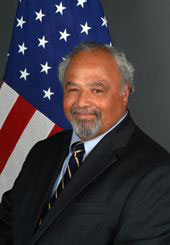Guest opinion by Dr. Eric Goosby: Moving PEPFAR from emergency response to sustainable effort
October 2010 | Volume 9, Issue 5

Dr. Eric Goosby
A decade ago, those of us engaged in HIV work in sub-Saharan Africa were witnesses to daily tragedies on a huge scale. Hospitals were not just full of people dying of AIDS, they were overflowing with multiple patients to a bed, spilling out onto the floors and in the hallways - any place where they could rest while waiting for some care.
Today, with American leadership, the task few thought was possible is well under way. Through Fiscal Year 2009, we directly supported almost 2.5 million individuals on treatment, the vast majority in Africa. And millions more are benefiting from prevention and care programs. And yet, there is much more work to be done, and a large, continuing unmet need.
As we responded to the HIV emergency in the first phase of the U.S. President’s Emergency Plan for AIDS Relief (PEPFAR), we tended to work through international implementing partners with existing capacity, in order to save as many lives as possible. While successful, this had the by-product of establishing or strengthening systems of care and delivery parallel to country public health systems, which are typically weak.
Reflecting President Obama’s Global Health Initiative (GHI) principle of support for country ownership, a major priority of PEPFAR’s second phase is to increase the capacity of countries at both the government and civil society level, so that countries are better able to manage, oversee, and operate their health systems -- and increasingly to finance them, based on their available resources.
We are approaching countries in a spirit of true partnership to identify, prioritize and meet health needs. PEPFAR’s support for country ownership is demonstrated through Partnership Frameworks, 15 of which have been signed to date. These are five-year, high-level agreements between the U.S. and partner governments that leverage our investments to obtain measurable financial, programmatic, and policy commitments to HIV and health systems.
Through Partnership Frameworks, we are demonstrating by our actions that we see governments as partners, rather than recipients or obstacles. An important recent Partnership Framework is the one we have entered into with Nigeria, which includes the first public affirmation by that country’s government that they expect to self-fund 50 percent of the response to HIV by the end of the five-year implementation period.
Another example of country ownership in action is the transition of treatment programs in 13 countries to the leadership of government structures and indigenous organizations. This transition is challenging but critical to ensure that these programs are deeply embedded in the national response and can be sustained for the long term.
During the initial, emergency phase of the program, we relied heavily on international NGOs, because they had the capacity to save lives quickly. In this second phase we have added to that activity a focus on sustainability and country ownership, which includes building the commitment and capacity of governments. As we move forward with that task, we will increasingly emphasize a third dimension of activity -- community empowerment.
As we pursue the GHI principle of support for health systems for sustainability, it is local community and civil society organizations that can play the critical role of ensuring accountability for country structures in a way that outsiders never can. PEPFAR planners at the country level and at headquarters want to empower communities -- including those directly affected by programs, such as people living with HIV -- to have the ability to provide that feedback to government ministries, Global Fund Country Coordinating Mechanisms, and other country structures. That dialogue is essential for true sustainability.
Dr. Eric Goosby is Ambassador at Large and Global AIDS Coordinator, overseeing implementation of the U.S. President's Emergency Plan for AIDS Relief (PEPFAR). He delivered an expanded version of these remarks in testimony to Congress on September 29, 2010.
To view Adobe PDF files,
download current, free accessible plug-ins from Adobe's website.
Related World Regions / Countries
Related Global Health Research Topics